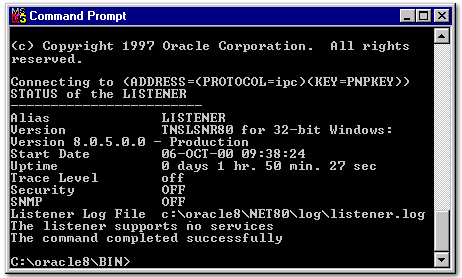RMAN Catalog Schema Separate Server
A recovery catalog is a schema stored in a database that tracks backups and stores scripts for use in RMAN backup and recovery scenarios.
The DBA suggests that the Enterprise Manager instance schema and RMAN catalog schema be placed in the same utility database on a server separate from the main servers. The RMAN schema requires approximately 16 megabyte per year per database backed up.
While developing this module, I decided to move everything off one machine and onto another spare machine. I installed my Oracle 8.0.5 database and started experimenting with what is possible. Things seemed fine until I came to this particular lesson and tried to connect to my local database that also served as my Recovery Manager catalog. I was moving machines around and ended up putting my recovery catalog on my local machine. Please note that this is not the normal configuration for a
After typing in the command that you see in my example:
The DBA suggests that the Enterprise Manager instance schema and RMAN catalog schema be placed in the same utility database on a server separate from the main servers. The RMAN schema requires approximately 16 megabyte per year per database backed up.
While developing this module, I decided to move everything off one machine and onto another spare machine. I installed my Oracle 8.0.5 database and started experimenting with what is possible. Things seemed fine until I came to this particular lesson and tried to connect to my local database that also served as my Recovery Manager catalog. I was moving machines around and ended up putting my recovery catalog on my local machine. Please note that this is not the normal configuration for a
- database and
- recovery catalog.
After typing in the command that you see in my example:
C:\oracle8\bin>rman80 target system/manager@mydb rcvcat rman/rman@mydb
I got a TNS error that my database could not be found. This perplexed me for a few weeks. In my NET80\ADMIN subdirectory are a few important files:
SQLNET.ORA - NAMES.DEFAULT_DOMAIN = world is an important entry.
My database was up and running. When I checked my NT task list, the listener was up and running. After mulling this over for a few weeks, I ran the following from a DOS window:
SQLNET.ORA - NAMES.DEFAULT_DOMAIN = world is an important entry.
TNSNAMES.ORA MYDB.WORLDwas configured to point to my machine and my local database, orc1.
LISTENER.ORA my LISTENERentries were set up correctly for my host and ports, my SID_LIST_LISTENER entries correctly identified my SID.
My database was up and running. When I checked my NT task list, the listener was up and running. After mulling this over for a few weeks, I ran the following from a DOS window:
C:\oracle8\bin\lsnrctl80 status
Check the following:

Connecting to (ADDRESS=(PROTOCOL=ipc)(KEY=PNPKEY))
As you can see, if your listener supports no services, you cannot listen. It is usually the obvious and simple problems that cause you the greatest confusion.
Please be aware of your SQLNET.ORA, TNSNAMES.ORA, and LISTENER.ORA entries and check the obvious.